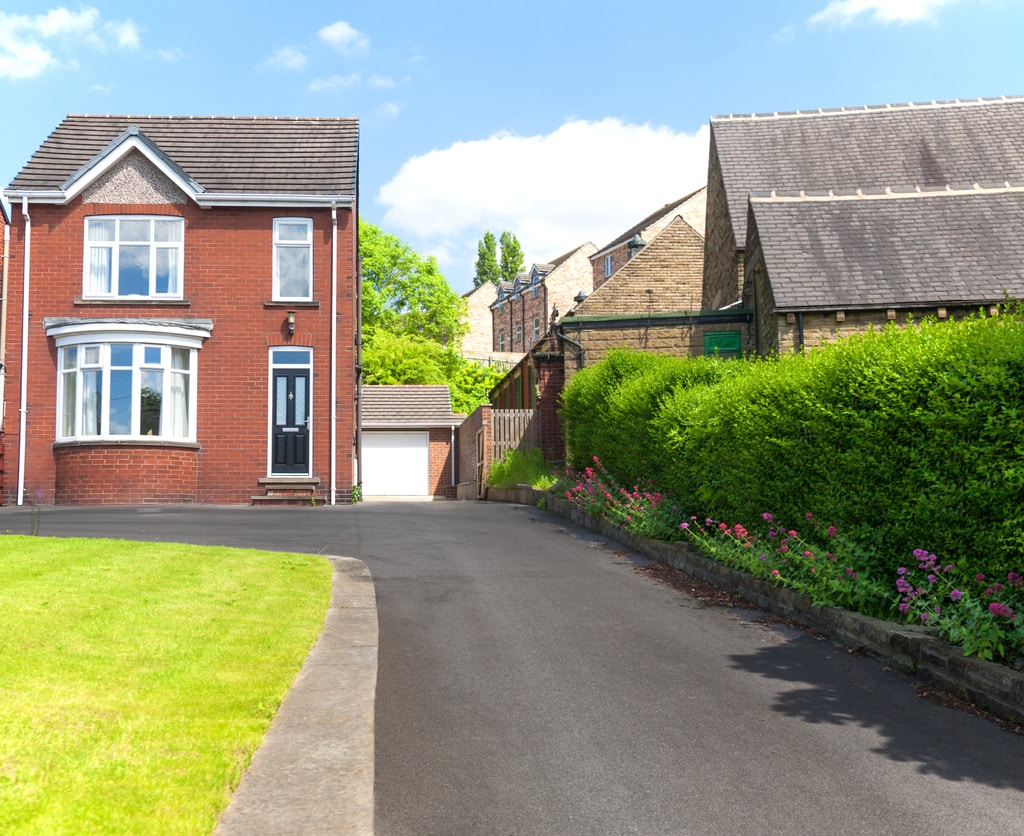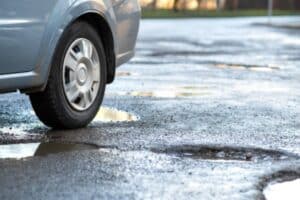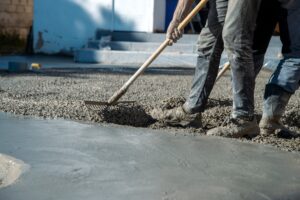You want your driveway to look good and last as long as possible without requiring much upkeep. While asphalt sealcoating provides a protective layer, you are not sure if it is worth the investment or appropriate for your situation. Whether you are a homeowner, property manager or an HOA decision-maker, there are pros and cons to sealing an asphalt driveway or parking lot that should be considered before any decision is made.
To help you determine if sealcoating is right for you, we will discuss sealing asphalt pros and cons to help you better understand your decision.
What Is Sealing/Sealcoating an Asphalt Driveway?
Asphalt is a cost-effective, long-lasting material that has made it popular for use in streets, parking lots, and driveways. However, exposure to UV rays, water, oil, and road salt can cause the asphalt to dry out, fade, fracture over time after installation.
A sealcoat is a protective layer with special oils and paving material. It penetrates the asphalt to give it a deeper, glossy, black appearance. It replaces oils and binders that have broken down or dried up and fills tiny aggregate gaps. As such, sealcoating is an excellent choice for protecting your driveway from weathering and wear and tear.
Read more: What is Sealcoating?
The Pros of Sealing an Asphalt Driveway
There are several sealing asphalt pros that make it an ideal material for protecting your driveway surface. Some of these benefits of sealer include:
Protection Against the Elements
Sun, rain, snow, ice, and wind can all take a toll on your driveway over time. A driveway sealer will help protect it from these elements, keeping it looking good for longer.
Restore Faded Asphalt
If your driveway looks a bit dull or faded, sealing can restore its black appearance. This will make it look great again without you having to replace the asphalt entirely.
Improved Curb Appeal
Fresh sealant on your driveway looks pretty impressive with its deep black appearance and reflective surface. Thus, asphalt sealant can be the perfect way to give your home’s exterior curb appeal without spending a lot of money.
Prevents Potholes and Cracks
Sealing your driveway will help prevent cracks and potholes from developing over time. This can save you a lot of money on repair costs which would otherwise need to be done when they get too large or deep.
Cost-Effective
As sealing an asphalt driveway is much cheaper than repaving, it is an excellent option for those on a tight budget. Asphalt sealant can also be done in sections as needed, allowing you to spread out the cost over time.
The Cons of Sealing an Asphalt Driveway
As sealing asphalt driveway pros and cons are important to consider. Sealing asphalt cons for consideration before investing are:
Driveway Will Become Hotter
As sealing asphalt driveway will make the surface smoother and more uniform, it makes sense that your car will heat up as a result. Thus, asphalt surfaces could be dangerous to pets or children who might play on the driveway when they get too hot.
Asphalt Sealcoating Is Not a One-Time Fix
Asphalt sealcoat is not a permanent fix and will need to be reapplied approximately every two to three years. This means that you will have to set aside time and money for regular upkeep to maintain the benefits of sealing your driveway.
Sealcoat Won’t Fix Low Spots
It may make rougher areas a bit smoother but not if it’s significant. Thus, you’ll need to address low-lying issues or spots in order for the seal coat to properly lay right.
Sealcoat Wears After a Few Years
Eventually, it will show the lighter-colored asphalt underneath and cause differences in color in higher traffic areas or smoother areas where the seal coat is thinner. However, this can be solved by seal coating again.
Your Driveway Needs to Be in Good Condition Before Asphalt Sealcoating
Before sealing your asphalt driveway, it is essential to ensure that it is in good condition. This means that any cracks or potholes need to be fixed, and the surface should be free of dirt, oil, or grease.
If these issues are not addressed first, they will likely reappear once the sealcoat has been applied. A pressure washer can help clear your driveway pavement of all debris, ensuring your fresh asphalt will set as a smooth paved surface.
What You Need to Know Before Deciding if its Right for You
Now that you know the pros and cons of sealing an asphalt driveway, you can decide if it is right for you. If your driveway is in good condition and you are looking for a way to protect it from the elements, a sealant is definitely a smart option. Just be sure to weigh all the costs and benefits before deciding.
Before sealing your driveway, consider:
- The condition of your driveway.
- How long do you want the driveway to last?
- If you are willing to do regular maintenance.
- The cost of sealing your driveway.
If all of these factors are in your favor, sealing your asphalt driveway may be the right choice for you.
How to Maintain Your Sealed Driveway with Minimal Effort
Once your driveway surface has been sealed, it is important to maintain its appearance. You can do this by regularly sweeping and cleaning the surface with a pressure washer, broom, or leaf blower. If you notice stains on the sealing layer, use a surface cleaner that will not damage the sealer until they disappear.
To keep your driveway clean, use a combination of detergent and water to scrub the asphalt surface, then hose it down thoroughly. Use a professional asphalt driveway sealer degreaser for oil, gas, or transmission fluid stains. Look for an eco-friendly, biodegradable oil stain removal product that does not include ammonia.
How Long Does Asphalt Sealer Last?
Sealant typically lasts around three to five years, but this varies depending on the climate, traffic, and how well it is maintained. For example, if you live in a colder area with more snowfall, the sealant will last longer than if you lived in a warmer climate.
Looking for an asphalt sealing quote in Utah? Contact Superior Asphalt, LC
In conclusion, sealing asphalt driveway pros and cons should be considered before sealing your driveway. While sealing will protect against the elements and prolong the life of your asphalt, it also comes with several sealing asphalt cons that should be carefully considered first.
If you are looking for asphalt seal coating services in Utah, contact us! We are here to help.




